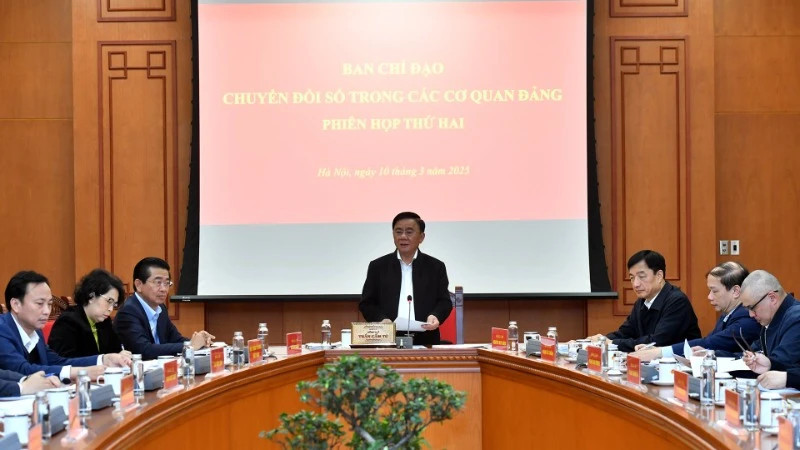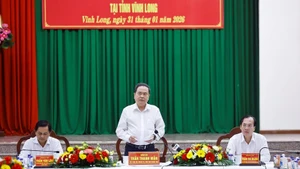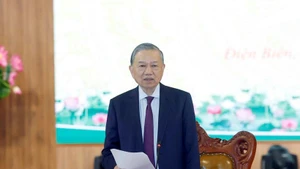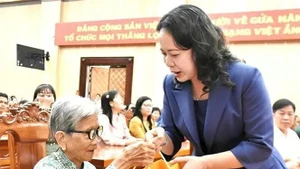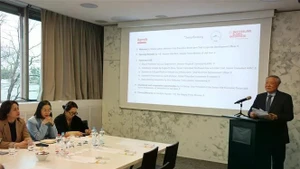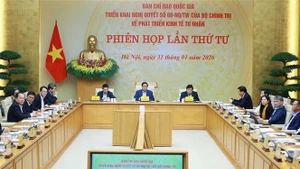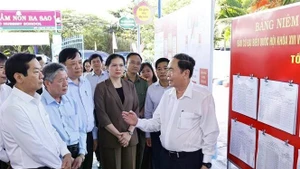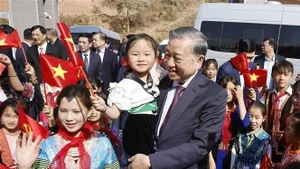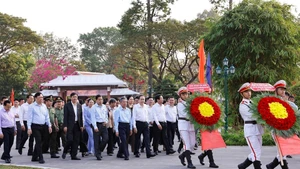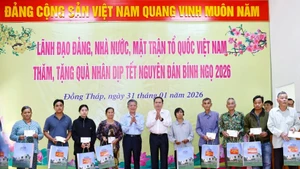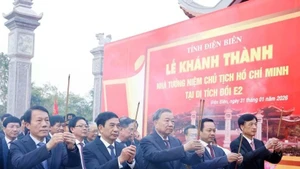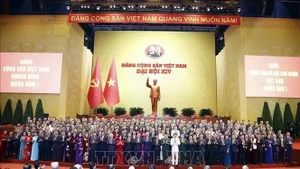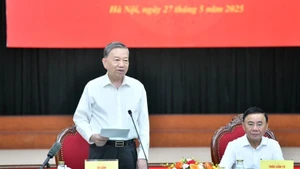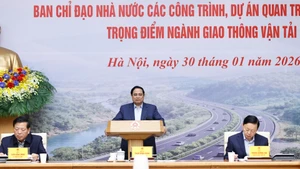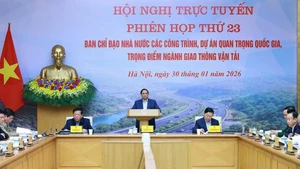Party organisations must take the lead in propaganda, education, and raising awareness about digital transformation among officials, Party members, and the public. They must also practice digital transformation in Party work to enhance efficiency and effectiveness, shortening the process of implementing the Party’s policies and guidelines to each official and Party member.
An inevitable trend in the current context
On December 22, 2024, the Politburo issued Resolution No. 57-NQ/TW on breakthroughs in the development of science, technology, innovation, and national digital transformation. The resolution clearly states that the development of science, technology, innovation, and digital transformation marks a key breakthrough and provides a primary driving force for rapidly advancing modern production forces, perfecting production relations, reforming national governance methods, fostering socio-economic development, preventing the risk of lagging behind, and propelling the country toward prosperity in the new era.
This strategic direction has received widespread consensus among officials, Party members, scientists, and the business community, both domestically and internationally.
On November 29, 2024, the Party Central Committee issued Decision No. 204-QD/TW, approving the Digital Transformation Project in Party Agencies. Digital transformation is now an unavoidable trend aimed at enhancing the efficiency of professional work and establishing a digital working culture within Party agencies.
The project’s objective is to comprehensively and effectively reform leadership methods, working styles, and operational efficiency, aiming to reduce processing time for officials and public employees while significantly contributing to administrative reform in Party agencies.
The project aims to establish a comprehensive, modern digital infrastructure and platforms, strengthen capacity, restructure technical infrastructure and organisation, and develop unified information and data systems. It also focuses on increasing connectivity, integration, and data sharing to support advisory and leadership activities within Party agencies from central to grassroots levels.
Additionally, it seeks to establish secure and legally compliant data exchanges between Party agencies, state agencies, the Vietnam Fatherland Front, and socio-political organisations, ensuring alignment with the National Digital Transformation Programme.
By 2025, digitised data will be cleansed and regularly used. All Party agency information systems and databases will be assessed and secured. Every user accessing the Party’s digital ecosystem will have a unified digital identity and authentication. The records of Party members, officials, and employees will be fully digitised and managed in a digital environment. Complaints, denunciations, and disciplinary investigations involving officials and Party members will be managed digitally.
All information related to Party ideological work will be carried out digitally, ensuring timely and official access to information, data, and documents. All citizen complaints and denunciations will be handled in a digital environment, and all public engagement activities will be digitised.
Additionally, all socio-economic data requests for policy advice and appraisal will be processed digitally. Foreign affairs communications will be digitised. Non-confidential documents will be digitally signed, sent, received, and processed anytime, anywhere on mobile devices.
Reporting and synthesis tasks will be conducted in a digital environment. Non-confidential and confidential documents will be digitised for management and usage. Health information of officials from deputy ministerial levels and below will be digitised and managed in a digital environment. All information systems supporting research, training, and political theory education will be consistently updated and integrated within a shared digital platform.
A centralised, shared data repository will be established for analysis, processing, distribution, and integration with national databases. Party agencies, the Vietnam Fatherland Front, and socio-political organisations will contribute to the shared data pool, facilitating information analysis, forecasting, and operational decision-making. Data within Party agencies will be digitised, standardised, and optimised for efficiency. Common-use databases will be developed to facilitate integration and synchronisation, including centralised user data, Party agency identification codes, digitised document repositories, and other shared categories.
Urgent actions required
After more than three months of implementation, digital transformation within Party agencies has seen initial positive changes. However, as this is still an early stage, the Party Agency Digital Transformation Steering Committee has identified several limitations that require urgent resolution.
Leadership and guidance on digital transformation remain insufficient, with some agency leaders not prioritising or personally engaging with digital tools and applications. Institutional frameworks and regulations are not being updated quickly enough, and administrative reform, workflow restructuring, and data digitisation have yet to receive adequate attention. Many officials continue to rely on traditional paper-based methods.
The steering committee emphasised that digital transformation is essential for strengthening the Party’s leadership, organisation, and management in the new era. Leaders of Party agencies must demonstrate strong political will and set an example by using digital tools and applications in their leadership and administrative work. This is a crucial reform, those unable to adapt should step aside to avoid becoming obstacles, as instructed by Party General Secretary To Lam.
The scope of the project extends to Party committees under the Party Central Committee, aligning with administrative mergers at the provincial level while eliminating district-level organisations and continuing the consolidation of commune-level administrations, as per Conclusion No. 127-KL/TW of the Politburo.
The steering committee has also called for the urgent completion of regulations and a standardised digital transformation framework across Party agencies. Administrative procedures must be streamlined, and workflow processes restructured to integrate digital solutions. A modern digital infrastructure must be established, particularly in the Party’s data centre and information systems, ensuring security and privacy while leveraging strategic technologies like artificial intelligence and big data.
Common-use digital applications should be developed for Party agencies to support leadership and operational activities, ensuring user-centric functionality. Adequate resources must be allocated, and skilled personnel mobilised to support the project’s implementation. Training programmes should be intensified to help officials and Party members effectively utilise digital technologies.
The Party Central Committee Office, the project’s standing agency, has been tasked with quickly deploying essential software for Central Committee meetings and Party congresses, such as a congress tracking system, a digital Party member handbook, an internet information collection and synthesis system, and a virtual assistant for Party congress organisation.
A digital feedback system for public and expert opinions on science, technology, innovation, and digital transformation will be launched on the Communist Party of Vietnam's official website from April 1, 2025. Additionally, the Government Cryptographic Agency will pilot a secure online communication system (TRIOS) at the Party Central Committee Office before expanding it nationwide.
A paperless meeting system will be implemented at the Party Central Committee Office starting April 1, 2025, with full deployment across Party agencies by September 30, 2025, in preparation for the 14th National Party Congress.
By April 2025, document management, administrative workflows, and the Communist Party of Vietnam’s website will be upgraded. A monitoring system for tracking the implementation of Resolution No. 57-NQ/TW and digital transformation progress within the Party will be deployed. The Party Central Committee, in collaboration with the Ministry of Public Security, will develop a centralised digital identity and authentication platform for Party agencies.
The Digital Transformation Project in Party Agencies is still in its initial phase, requiring urgent and decisive actions. The commitment of Party leadership, collective political determination, and unity among officials and Party members are crucial for its success. Following General Secretary To Lam’s directive, central Party agencies must take the lead in digital transformation, setting an example for the entire system.
The successful implementation of digital transformation within Party agencies will be a breakthrough, demonstrating the Party’s leadership in executing Resolution No. 57-NQ/TW on national science, technology, innovation, and digital transformation.
To maximise the impact of this resolution, the Digital Transformation Department will collect feedback on its implementation and evaluation indicators via the Communist Party of Vietnam’s official website (dangcongsan.vn) from April 1, 2025.
